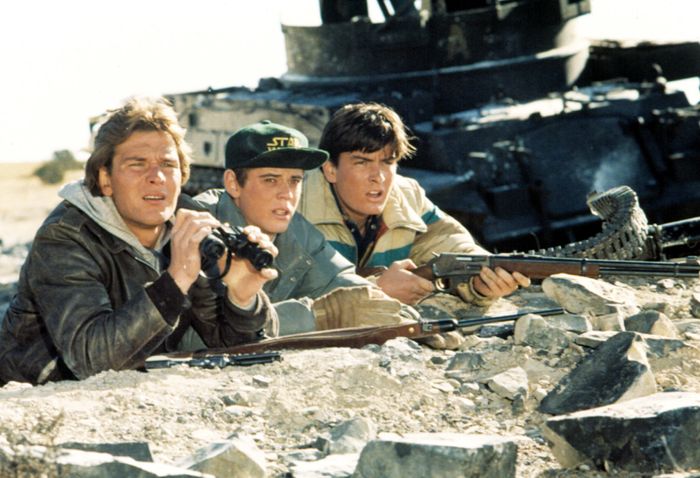In 2008, Metro-Goldwyn-Mayer Inc. desperately needed something familiar. The studio was fending off bankruptcy, so executives scoured the studio’s library of old movies to see what could be remade. Soon a contender emerged: “Red Dawn.”
The 1984 hit film starred Charlie Sheen and Patrick Swayze as teenage football players whose hometown is invaded by Communist forces from the Soviet Union. The high-school students grab hunting rifles and fashion homemade bombs. The Cold War had cast Soviets as the evil-empire threat to the U.S. Across the multiplex around the same time, Rocky boxed a Soviet fighter named Ivan Drago and John Rambo mowed down Communist soldiers. “Red Dawn” brought the Cold War battle close to home by placing it in the Colorado suburbs, where patriotic teenagers furiously fought back.
The premise of “Red Dawn” helped it connect with teenage audiences. MGM hoped to tap into that resonance when it asked screenwriters how they would handle a remake. One thing was clear: You couldn’t redo “Red Dawn” with Russia as the invading enemy.

In the original ‘Red Dawn,’ released in 1984, plucky American youths played by Patrick Swayze, C. Thomas Howell and Charlie Sheen battled Soviet invaders.
Photo: MGM/Everett Collection
“Who’s the villain?” Jeremy Passmore, one of the writers of the new version, asked MGM executives.
There was an obvious answer: China.
In most respects, the “Red Dawn” remake that eventually emerged was hardly memorable—it grossed $45 million in a year when “The Avengers” and “The Dark Knight Rises” each made 10 times as much. Yet its journey from a concept in the MGM C-suite to finished film would be referenced in the years to come as a turning point in Hollywood’s relationship with its most important foreign market: China. Today, stars like John Cena apologize in Mandarin for angering Communist Party officials, “Simpsons” episodes are scrubbed from streaming services for Tiananmen Square jokes and companies like Walt Disney Co. strike deals with state-backed entities to maintain access to the country’s 1.4 billion consumers.
“Red Dawn” would become a case study observed by every producer in Hollywood who needed this market to make a profit. And soon, it wouldn’t be just Hollywood taking the lesson of the movie to heart. Every industry that wants to do business with China, from cars to fashion to smartphones, now knows you don’t get far there by angering the regime. That risk is on prominent display this month as global companies trumpet involvement in the Beijing Winter Olympics, yet face domestic criticism for doing business in a country increasingly viewed as a foe to the U.S.
MGM had to reckon with a changing world order, as well. The studio was planning to release the new “Red Dawn” in the wake of a 2008 recession that shook faith in the American economy, a time of high unemployment and a trillion-dollar deficit. China, on the other hand, had just hosted the world at the Summer Olympics in Beijing. Chinese manufacturers were building factories in the U.S., a development that was once unthinkable to most Americans. A 2010 Pew Research poll found about 47% of American respondents said they thought China’s growing economy was bad for the U.S.; nearly 80% said the country’s modernizing military was a threat. The views represented a shift away from America’s long-held assumption that it was and would always be the world’s unimpeachable superpower.
Mr. Passmore got to work imagining a Chinese assault that turned a new group of teenagers into suburban vigilantes. It was a chance for “Red Dawn” to perform a function that many movies, from “Invasion of the Body Snatchers” to “Rosemary’s Baby,” had before: to reflect subconscious anxieties back to audiences as popular entertainment. It could have been, against the B-movie odds, an era-defining statement about the shaky viability of the American empire. Instead it became a movie of its time for a different reason—one that proved the power of China’s booming box office.
Fakeistan
Another writer MGM recruited to take a stab at his own script for the “Red Dawn” reboot, Carl Ellsworth, accepted the gig on one condition: “I don’t want to do Fakeistan invading the U.S.,” he says he told MGM executives.

Red Army meets Golden Arches in a scene from the 1984 ‘Red Dawn.’
Photo: MGM/Everett Collection
Mr. Ellsworth had a friend with connections at the Pentagon, so he went to Washington for inspiration. After turning over his cellphone to prevent foreign surveillance of the meeting, Mr. Ellsworth outlined his new “Red Dawn”: China attacks Taiwan, forcing a U.S. response. China dumps U.S. debt unannounced, sending the U.S. economy into a tailspin. Chinese paratroopers land on suburban lawns and Chinese generals take over city squares.
Mr. Ellsworth says he felt insecure describing this Hollywood fantasy of Chinese war games to real-world military personnel. But his schlocky scenario was met with the silence of recognition.
“No one ever said, ‘That’s ridiculous. That would never happen,’ ” he said.
The “Red Dawn” scripts written by the two men came in to MGM, each imagining a Chinese invasion of the U.S. Mr. Passmore went back to work at his temp job in quality-control testing for Deluxe Entertainment, a video-technology company, until one day the movie’s producers got back in touch.
“You’re coming in tomorrow,” he recalls being told. “And we’re meeting with Tom Cruise at noon.”
At this time, Mr. Cruise wasn’t only the marquee star of “Risky Business” and “Mission: Impossible.” He was also the head of United Artists, a storied studio that became a subsidiary under MGM in a deal that turned the A-list action star into another Hollywood executive giving notes on a script—or in this case, two scripts that needed to be sutured into one.

As head of United Artists, the studio making the ‘Red Dawn’ reboot, Tom Cruise offered notes as the script took shape. Neither he nor anyone else involved in the production foresaw the problems that would ensue from casting China as the bad guy.
Photo: Yanshan Zhang/Getty Images
Cruise, along with Passmore and a small cadre of MGM executives, spent a week going through the script page by page, examining each moment from the different versions to arrive at a final product.
Every detail was debated except for one: No one, recalled Mr. Passmore, asked whether casting China as the invader was a bad idea.
‘Tempers here will probably explode’
When photos from the “Red Dawn” set spread through state media outlets throughout China, the country’s state-run newspapers got to work trashing a movie that the nation’s citizens would likely never see.
“Tempers here will probably explode like kernels of movie house popcorn” when the movie comes out, China Daily wrote in an April 2010 editorial, calling it a “ticking time bomb.”
MGM executives quietly told crew members they could take their names off the “Red Dawn” credits if they feared retaliation. The studio knew well what could happen when an American company drew China’s ire. In the 1990s, the studio had released the Richard Gere drama “Red Corner,” about a U.S. businessman trapped in the country’s Kafkaesque legal system. The movie got MGM temporarily banned from China.
But criticism from China was only one issue facing MGM executives at the time. The studio had been paying about $300 million in annual interest on an outstanding $3.7 billion loan during the development of “Red Dawn,” and filed for bankruptcy protection before shooting wrapped. To raise money, MGM started selling off some newly completed productions.
Rival studios came in to determine whether they wanted to buy “Red Dawn.” But something had changed in the two-plus years between the moment Mr. Passmore was told to cast China as the villain and when the movie was ready for release. Work on the script had started in the summer of 2008, and filming wrapped in late 2009—days before “Avatar” would gross more than $200 million in Chinese theaters and awaken Hollywood to the nation’s economic potential. The trend line was clear: box office was rising in China just as it was stagnating in America.
By the time editing finished in mid-2010, no Hollywood executive would touch a movie that turned their most important new customer into the villain. If MGM itself released the movie, even just in the U.S., China could retaliate by refusing to show the studio’s more lucrative James Bond movies in its market.
For the producers of “Red Dawn,” that meant the only solution was a drastic one: changing the enemy in the film.
It wouldn’t be China invading the U.S. in this “Red Dawn” remake, MGM executives decided, but North Korea.
North Korea was a real-world antagonist of the U.S., they reasoned. And most important, Hollywood didn’t sell tickets in North Korea.

New kids, same tactics: Isabel Lucas and Chris Hemsworth battle North Korean invaders in the 2012 ‘Red Dawn.’
Photo: Open Road Films/Everett Collection
A current MGM spokesperson did not respond to request for comment. A spokeswoman for Gary Barber, MGM’s chief executive from late 2010 to 2018, declined to comment.
‘All these subnightmares’
The crisis soon moved from MGM’s executive suite to the computer monitors of employees working in a two-story concrete building on a residential street in the San Fernando Valley, next door to a Physicians Diagnostic Reference Library.
There, the team at Custom Film Effects specialized in “hidden effects” jobs: removing an errant boom mic from the frame, smoothing out the back acne of a shirtless action star, erasing an actress’s underwear to make her appear to be fully nude.
The demands of the “Red Dawn” job immediately took over the office.
This wouldn’t be a copy-paste operation of swapping in one nation’s flag for another. Throughout the movie, Chinese banners and propaganda posters were seemingly everywhere. Even the epaulets on the soldiers’ uniforms had to be changed, since they were Chinese military insignia and not North Korean ones.
“The flags are one nightmare unto themselves, and then there are all these subnightmares,” said Jamie Baxter, the lead CFE illustrator.
To Mr. Baxter, the whole North Korean mess felt like a waste of money.
Wouldn’t the effort be better spent on making the movie a better story? Whatever, he thought. At the time, he was already putting in extra hours to make money for his new wife and stepson.
I’m a cog, he thought to himself. A cog charging overtime.
The whole thing took Mr. Baxter and a small team of colleagues two months. When the revised movie was turned over to MGM, CFE was paid $1 million and didn’t take a credit.
‘North Korea? It doesn’t make any sense’
Changing the “Red Dawn” villains required more than just cosmetic swaps. New dialogue would need to explain that it was North Korea invading.

Street-fighting men: Josh Hutcherson and Connor Cruise (Tom Cruise’s son), run for cover in the 2012 ‘Red Dawn.’
Photo: Open Road Films/Everett Collection
“This is the most ridiculous thing I’ve ever heard in my life,” Mr. Ellsworth says he told executives when they informed him of the plan.
Hollywood was losing its nerve, he thought. “Red Dawn” wasn’t Truffaut or even Spielberg, but this was one country censoring another country’s art. What had happened to freedom of expression? Was anyone going to speak up here? Would he?
Then Mr. Ellsworth started to weigh his own financial concerns. The movie’s release in theaters would mean a cash payment for him, followed by residuals from DVD sales and cable-TV deals. He’d live off those checks for a while, supporting his wife and two children. And it was in his best interest to be an agreeable writer, not a difficult one. Moral outrage over the decision wasn’t going to do him any good. So he went in to help salvage the movie.
Sitting in the producers’ offices off Sunset Blvd., Messrs. Passmore and Ellsworth shoehorned as much logic as they could into this new version of “Red Dawn.” The opening sequence explaining China’s assault went away, replaced by generic news reports of geopolitical buzzwords: Markets! Depression! Cyberattacks!
The writers added dialogue alluding to a plot involving more countries than just North Korea, a detail they thought made it somewhat more believable. The actors recorded these new lines, one of which sounds like the writers channeling their own frustration into the characters.
“North Korea? It doesn’t make any sense,” one character asks.
Audiences agreed. The revamped “Red Dawn” was purchased by FilmDistrict, a small company with no business in China, and came out in November 2012. When the movie made about $45 million at the U.S. box office, it wasn’t a total bomb, but certainly didn’t do well enough to recoup the film’s budget. Still, the outcome meant that MGM would avoid retaliation that kept its bigger, more expensive movies out of Chinese theaters.
SHARE YOUR THOUGHTS
What changes have you noticed Western companies make in response to China’s growing clout? Join the conversation below.
When “Red Dawn” hit theaters, critics cited the villain switch in their pans of the movie. But the public response to MGM’s decision was surprisingly muted. Among the few constituents to criticize MGM’s decision at the time were Michigan militia members who loved the original 1984 film. They called the changes a “cop-out.”
It was a bigger story in China, where state-run publications bragged about MGM’s panicked edits. One state-run outlet reminded readers that the edits came “without a single word from Chinese authorities.” The reminder it gave Hollywood would prove more consequential.
In the years since, no other movie since “Red Dawn” has been put into production by a Hollywood studio and cast China as the villain.
Adapted from “Red Carpet: Hollywood, China, and the Global Battle for Cultural Supremacy” by Erich Schwartzel, to be published on Feb. 8 by Penguin Press, an imprint of Penguin Publishing Group, a division of Penguin Random House LLC. Copyright © 2022 by Erich Schwartzel.
Write to Erich Schwartzel at [email protected]
Copyright ©2022 Dow Jones & Company, Inc. All Rights Reserved. 87990cbe856818d5eddac44c7b1cdeb8








